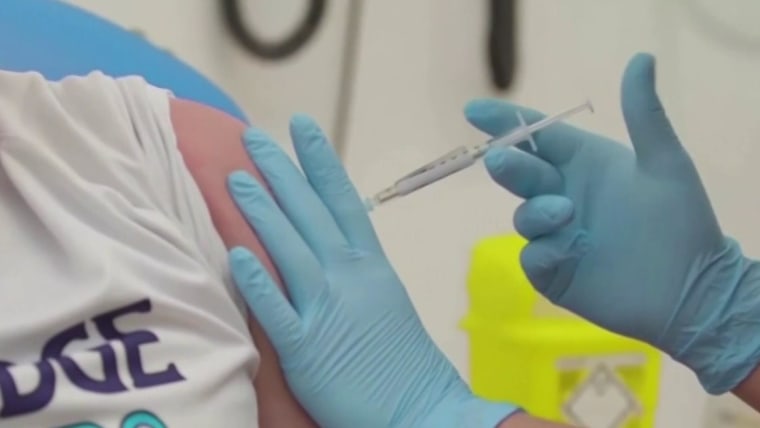Scientists have zeroed in on a handful of mutations in the coronavirus that they say could pose new public health challenges if they circulate widely.
Their focus: The tiny spike proteins that cover the outside of the virus.
It’s these proteins that researchers have successfully targeted to create vaccines, using them to prime the body’s immune system to make antibodies to fight the virus. But it’s also where they’ve observed some mutations that have forced vaccine manufacturers to react. A variant first found in South Africa is of particular interest due to mutations to the virus’s spike protein that can make antibodies less effective against it.
And while none of those changes seem to have resulted in a virus that’s able to evade the current vaccines, it’s an area of intense focus for coronavirus researchers.
“The spike protein is like the key that unlocks our cells,” said Simon Clarke, an associate professor of cellular microbiology at the University of Reading in the United Kingdom. “If you have mutations on the spike protein, it could make that key work more effectively, or it could change the structure of the key ever so slightly so that it can still gain access to our cells and now antibodies can’t bind to it and stop it from working.”
An early analysis from Moderna found that while its vaccine appears to be less effective against the South African variant, antibodies remained above protective levels. The Pfizer-BioNTech vaccine is only slightly less effective against the South African strain, according to a study that has not yet been peer-reviewed.
The coronavirus has likely undergone thousands of changes since it first spilled over into humans. Several different variants, including one that was first reported in the U.K. and another that is thought to have emerged in Brazil, are already being tracked worldwide.
But scientists remain anxious about the emergence of other coronavirus variants, especially if one emerges that renders the vaccines obsolete.
“Mutations can make a virus more transmissible or make a virus less susceptible to some antibodies, so that’s always a big concern,” Clarke said.
So far, the vaccines appear to protect against the known variants, said Dr. Bruce Y. Lee, a professor of health policy and management at the City University of New York. He added that even if a vaccine is less protective against one strain, there are likely still benefits, such as preventing more severe cases of Covid-19, which not only helps patients, but also minimizes the strain on hospitals and health care workers.
“It’s like how even if a flu vaccine is 30 percent effective, we still recommend getting a flu shot,” Lee said.
But that doesn’t mean there aren’t still risks — especially with the crucial role played by the virus’s spike protein.
Both the South African variant and the U.K. variant contain a spike protein mutation called N501Y that is thought to make these strains more contagious. The South African variant also carries a mutation known as E484K, also on the spike protein, that could make it less susceptible to antibodies produced by the vaccines or ones built up from natural infection.
And since the vaccines target the spike protein, Lee said, there’s a worry that mutations to this part of the virus could affect how well the vaccines work.
“If you change the spike protein enough, the question becomes: how will the immune response change?” he said. “The effectiveness of the vaccines really depends on our immune response to that spike protein.”
Research is still ongoing but the observed declines in vaccine efficacy have already prompted Moderna to begin tweaking its existing vaccine to make it more effective against emerging strains. Although Moderna’s vaccine appears to be protective against the known variants, the company’s CEO Stéphane Bancel said last month that the upgrades are being developed “out of an abundance of caution.”
AstraZeneca and Oxford University, which jointly developed a vaccine that is authorized for use in the U.K. but not yet in the United States, announced Wednesday that they intend to produce an upgraded version to protect against the known variants that could be available in the fall.
And scientists are expecting more variants to emerge as the pandemic evolves. Scientists in the U.K. reported Tuesday that the E484K mutation seen in the South African variant has also been found in a small number of cases involving the U.K. strain in England.
“The more a virus replicates, the more chances you have for random changes,” Lee said. “A lot of these changes won’t make a difference, but every now and then, you’ll get a change that gives the virus an advantage — making the virus better able to survive, replicate or infect people.”
That prospect adds urgency for countries around the world to aggressively control the virus’s spread, thereby limiting the opportunity for new, more problematic variants to circulate.
“What we do can really affect the trajectory of the pandemic in the coming weeks,” Lee said.
Source: | This article originally belongs to Nbcnews.com












